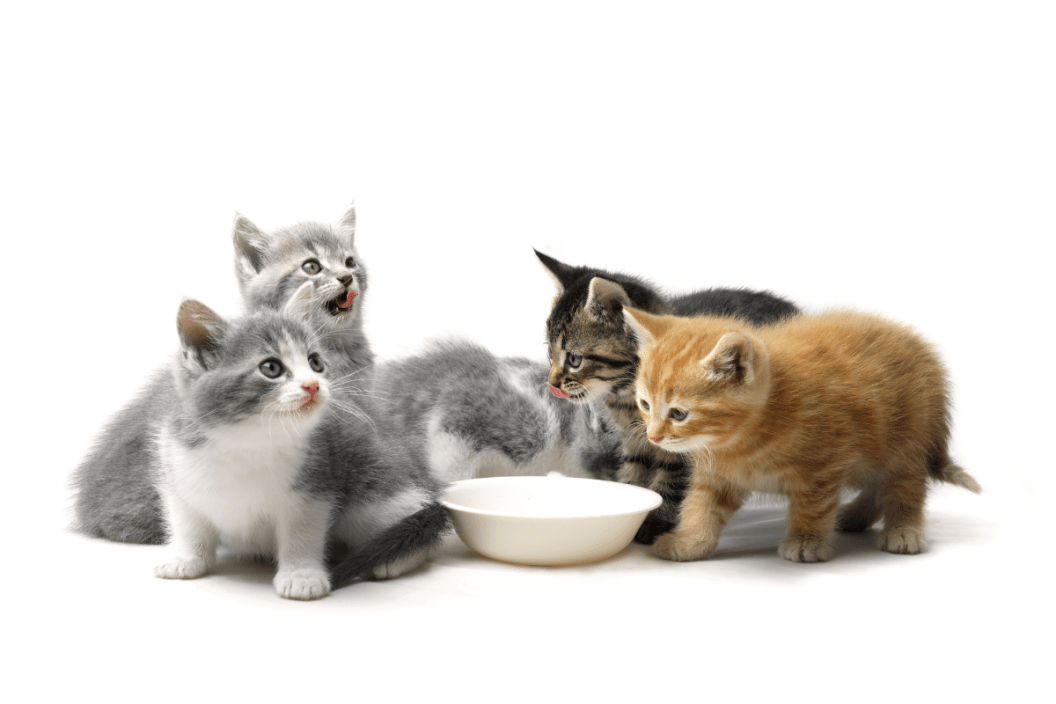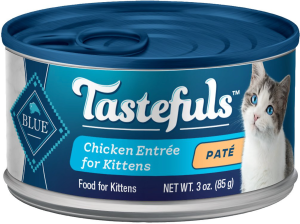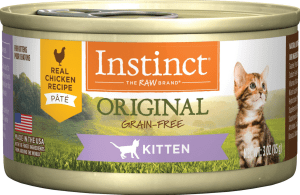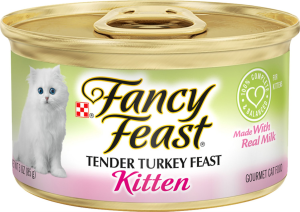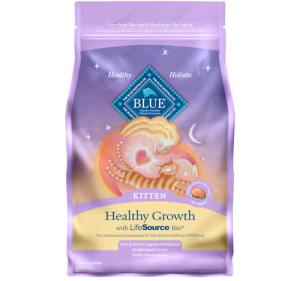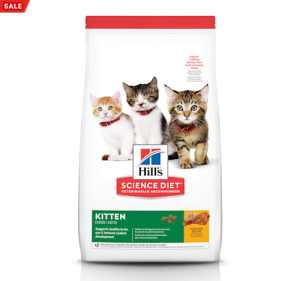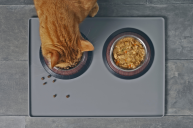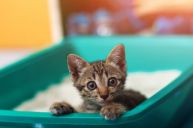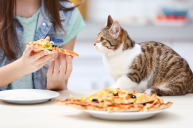You've got a hungry kitten. Now what?
Maybe it just turned up in your yard one day. Or a friend's cat had a litter. Or you decided to rescue one at your local shelter. However that little cuddle ball of fuzz ended up in your life, congrats on the new addition to the family! You're in for a world of fun. But right now, you probably find yourself wondering how and what, exactly, to feed a growing kitten. With wet cat food, dry cat food, high protein, canned food, and mentions of taurine and the phrase obligate carnivore, it can be hard to figure out what kittens need.
One of the first questions you might ask is whether dry food or wet food is better for a kitten. The answer: both.
"When feeding your kitten, well-balanced nutrition and kitten formulas are crucial for their growth, and can be found in both dry and wet foods," says Callie Harris, DVM, veterinarian at Purina. And how long should a kitten eat kitten food? Until 12 months of age, when they're considered adult cats. The exception is large breed cats, such as Maine Coons and Norwegian Forest Cats. Those felines aren't considered full grown until 18 months to two years of age. Check in with your vet to be sure when to start transitioning to adult food.
"Feeding kittens a combination of wet and dry food adds a variety of flavors and textures in their diet," continues Dr. Harris. "Neophilic cats like new things and are happier with a varied diet." Plus, she adds, that will make them more flexible about the type of food they eat when they're grown. For sure, we know plenty of adult cats who just will not eat dry or wet food.
Regardless of the type of food you feed your new kitten, the best kitten food will be AAFCO (Association of American Feed Control Officials) certified pet food, meaning that it contains the right amount of supplements, omega-3 fatty acids, amino acids, calcium, and more for proper brain development and nutritional needs in both young kittens, as well as other life stages. Adult cat food will have a different formulation than kitten food, so make sure you're grabbing the kitten variety from Chewy or Amazon when you shop.
Wet Kitten Food
When can a kitten eat wet food? You can start introducing it at around three weeks, so in all likelihood, if you've adopted a kitten or one walked up to your back door, she's old enough to give it a go. Dr. Harris notes that wet kitten food is easier for the tiniest newbies to chew, and it helps increase total water intake. Hydration is extremely important for any cat's urinary tract, and wet food can help meet that need.
As to how much wet food a kitten should eat, it's best to confirm with your vet. It can vary quite a bit depending on age and current weight. Here are quality options for "first foods" for your new fur baby:
Wellness Core Kitten Turkey & Chicken Liver Recipe
Consistently earning all-around high marks from reviewers, the Wellness Core Kitten Recipe is a standout first food. The pate texture is pudding-soft, so it's easy for your wee one to take those first nibbles. It's super high in all-important protein, and it's calorie-dense to feed your kitten's high energy and growth. With a first ingredient of real turkey, this protein-rich food has a stellar ingredients list which includes high-quality ingredients like cranberries, chicken liver, turkey broth, chicken meal, and fish oil. Kittens can graduate to Wellness Complete Health when they're a bit older.
Blue Buffalo Tastefuls Chicken Entree for Kittens
With 122 calories in each 3-ounce can, this is a great option if you took in a feral kitten who needs to gain weight. Rich in high quality protein with no by-product meal or corn, it's bolstered with sweet potatoes and brown rice and has a soft texture. Real chicken and no artificial colors or artificial flavors make this a great pick.
Instinct by Nature Original Grain-Free Kitten Formula
This grain-free option wins rave reviews. One reviewer notes that both her kittens come running when they hear the can open! With no fillers like many other food brands, the protein content is made up of all natural ingredients. It also has a texture geared to kittens' chewing ability, and is extra low in carbohydrates.
Fancy Feast Tender Turkey Feast
Fancy Feast is a familiar favorite to many cat parents who consider it to be one of the most palatable wet foods on the market, at least judging by how their cats gobble it up! The brand's kitten offering has high-quality animal protein as the main ingredient. It's a hydrating, nutritious option at about the most budget-friendly price around.
Dry Kitten Food
When can kittens eat dry food? According to the ASPCA, by about five or six weeks of age. "Adding dry food in your kitten's diet not only adds variety to their mealtime, but the crunchy kibble may also help reduce plaque and tartar buildup on teeth," informs Dr. Harris.
Here are a few top-rated options worth considering for solid food:
Royal Canin Feline Health Nutrition Kitten Food
Royal Canin is a long-standing favorite among vets and pet parents, and their kitten-specific recipe is no exception. The formula, for cats ages 4 months to 1 year, is packed with the protein that's essential to their well-being, along with minerals, vitamins, and antioxidants. It also has a blend of antioxidants and vitamins that helps support their immune system.
Blue Healthy Growth Chicken & Brown Rice Recipe Kitten Food
Blue has become a really popular choice recently, with all of their foods having no byproducts, corn, wheat, soy, artificial preservatives or flavors. This kitten recipe, meanwhile, boasts chicken, brown rice, and easily digestible fruits, along with fatty acids found in mother cats' milk.
Hill's Science Diet Chicken Recipe Kitten Food
All of the foods in Science Diet's line are made in the United States and are the go-to recommendation of many vets. This kitten-specific food focuses on high quality protein and minerals that build strong bones. It also contains DHA to boost your little friend's brain and eye development.
Merrick Purrfect Bistro Grain-Free Healthy Kitten Food
Formulated specifically to help all kittens thrive, Merrick's grain-free kibble is moderate in fat, high in protein, and low in carbohydrates. Plus, antioxidants help strengthen a kitten's immune system, while fiber works to keep hairballs at bay.
What's your favorite kitten food? Share with us on the Wide Open Pets Facebook Page!
Editor's Note: Products featured on Wide Open Pets are independently selected by our editors. However, when you buy something through our links, we may earn a commission.
